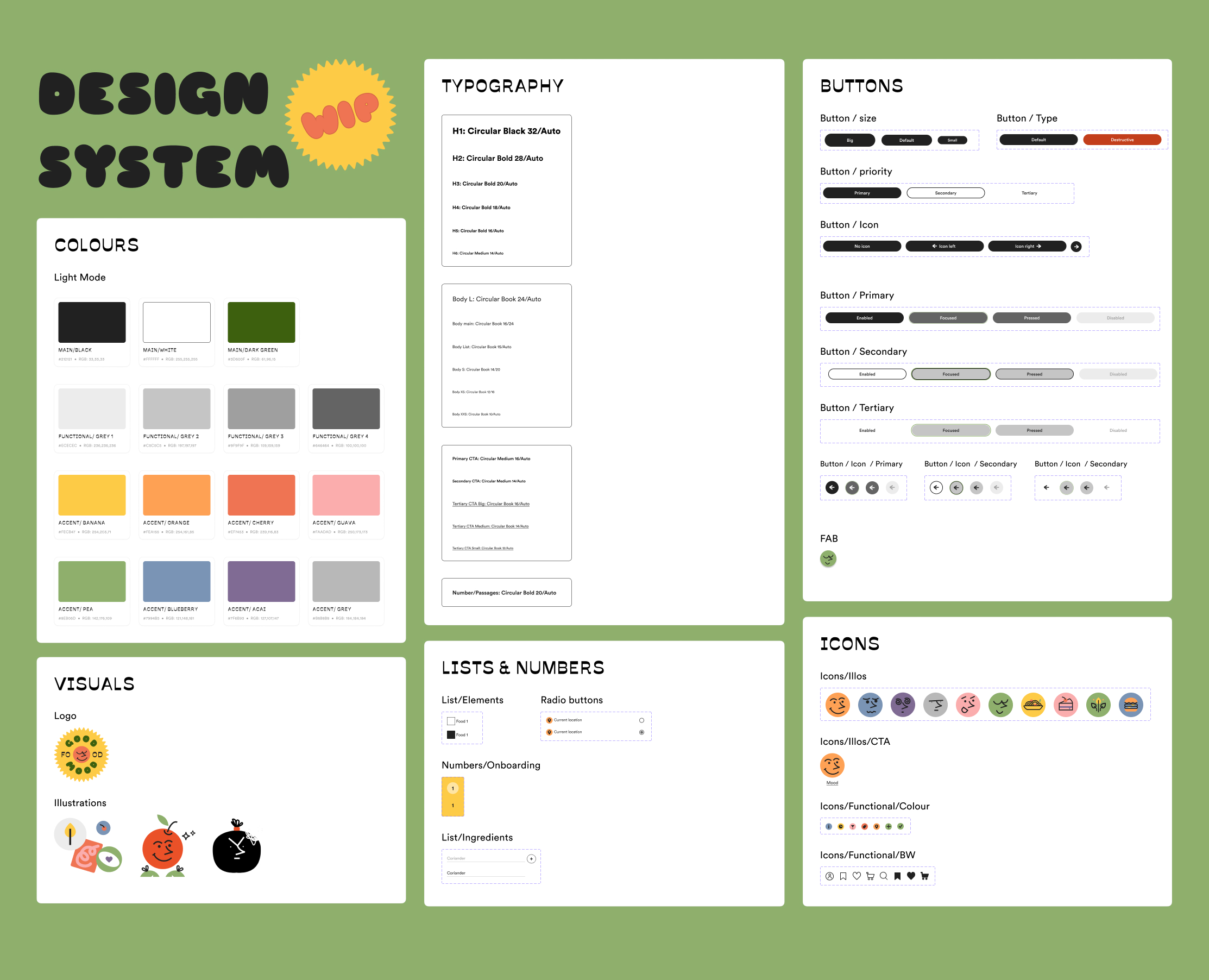When we consider the connection between the brain and the gut, it’s important to know that 90% of serotonin receptors are located in the gut. There’s a relatively new field of nutritional psychiatry that helps patients understand how gut health and diet can positively or negatively affect their mood. The health of our guts becomes central not only to the health of our body, but also to the health our mind.
My role
- Personal project/idea
- UX/UI Design
- User interviews
- Illustrations
- Art direction
Context
When I started this project I was looking into uncovering the pain points and needs of food delivery apps users.
During the initial discovery phase (interviews and surveys), I found out that 50% of the contributors had diet requirements.
Why? They had health conditions (ie: IBS, IBD), allergies or intolerances (ie: gluten, lactose) or they made lifestyle choices (ie: vegan/vegetarian). Some of them found difficult to have dinner with their friends and, long term, in some case, this issue would influence their social behaviour and ultimately leave them “depressed and sad”.
Science
As I was going through the interviews I started to get very interested in the relationship between our guts and our general health (body and mind).
I saw a lot of researches at time that started nudging at how what we eat really makes a difference for our health, and how and why a “generic” approach wouldn’t working anymore: blood sugar spikes can trigger inflammation, which iif repeated constantly could lead to chronic diseases.
I found more and more articles about how the guts health could influence your mood. According to recent studies there is anatomical and physiologic two-way communication between the gut and brain via the vagus nerve. The gut-brain axis offers us a greater understanding of the connection between diet and disease, including depression and anxiety.
Having a healthy, varied diet that’s rich in plant foods can lift our mood and improve mental health conditions like depression.
Discovery
I started by interviewing users of existing food apps/services and found out that:
50%
feels like these apps don’t do enough to take care of their needs
100%
users agreed that the food you eat can change your mood
50%
thinks that most of the existing apps don’t consider specific dietary requirements
I then also interviewed users of “food tracking” apps
90%
agreed that tracking their food help them stay committed to their goals and they enjoy to see the results
70%
think they would be interested in tracking their mood and body responses in relation to the food they eat
50%
said they would be interested in knowing more about the link between the food they eat and their guts health
Findings
I went into the project thinking that something was missing in the food delivery field but I couldn’t imagine I would end up to look at it from a completely different point of view.
Findings
- A pretty busy life and leaves very little time to be mindful about what they’re eating
- When under stress or when feeling sad we go for the food that is going to end up to make us feel worse, without knowing it
- More and more people have either known allergies, intolerances or health conditions that reduce their choices when it comes to decide what to eat, with increasing difficulties when they are at work or their with friends and family
- Lack of awareness and education on the impact of the gut-brain connection
- Anxiety and depression can come from your guts, and sometimes are also linked to other long-terms conditions
New goal
People can get stressed around food for many different reasons: lack of time, health issues, scarcity of choices. And they might also not know that some food would make them feel good or bad. So overall, their relationship with food can make them feel: embarrassed, stressed, depressed, tired.
There should be a way for everyone to enjoy food in a mindful way, to see how it could change their mood and help managing their mental and physical health.
Users
The users interviewed belong to mainly 2 different groups
Would like to do better but need a push
- Lazy (by they own definition!) but want to improve
- Busy life, no time
- “Bad at cooking”
- Would order a lot of takeaways or go to restaurants but try to keep it “healthy”
- Feeling guilty for their food choices
- Very stressed
Passioned about health and food
- Can and want make time for cooking their own food
- Bring their own food to work
- “Cooking is fun”
- Strong-willed/consistent
- Interested in healthy choices
- Some of them might have intolerances, allergies or specific dietary req which triggered the above behaviours
Roadmap
MVP
Track what you eat to improve wellbeing and mood
Personalised onboarding journey which will result in ad hoc tips and data collection
P1
- Suggest recipes based on the collected data and that you can also filter through
- Users can track their mood depending on the food they eat by adding the recipe to their food log
P2
- Access to articles about food, guts health, scientific facts etc, all selected from different magazines/websites
- Notifications “fact of the day”: short interesting fact about foods and drink and habits
P3
- Delivery dervice that allows users to subscribe to receive frozen mono-portion of good mood food
- Users can track their mood depending on the food they eat. They’ll have to simply scan the food barcode.
Onboarding
As first thing I decided to concentrate on the Sign Up/Onboarding journey. This can be considered a crucial phase to get the user committed. Including references to scientific studies, reassurance on the results and clarity on the goals are key to the success.

